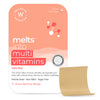Let’s be honest—most of us aren’t getting all the nutrients we need from food alone. Despite our best efforts, busy schedules, processed foods, and even soil depletion make it tough to hit the recommended daily intake of essential vitamins and minerals. That’s where taking Multivitamins Daily comes in. Think of them as your daily nutritional backup plan—filling in the gaps and ensuring your body has what it needs to thrive.
How Multivitamins Support Overall Health
At their core, multivitamins are a powerhouse of essential nutrients—vitamins, minerals, and sometimes herbal extracts—all packed into one convenient dose. But what exactly do they do for you?
Acts as Nutritional Insurance
Even with the healthiest diet, certain key nutrients may be missing. A Daily Multivitamin ensures you’re covered, delivering essential vitamins like B-complex for energy, vitamin D for bone strength, and zinc for immune defense.
Supports Energy & Vitality
Feeling drained even after a full night’s sleep? A high-quality multivitamin provides B12, iron, and magnesium—key players in energy production—so you can stay active and sharp throughout the day. No more mid-afternoon crashes!
Helps Strengthen Immunity
The immune system is your body's frontline defense. Nutrients like vitamin C, D, and zinc play a major role in maintaining strong immunity, helping your body fight off infections and recover faster.
Promotes Healthy Aging
Aging gracefully isn’t just about skincare—it starts from within. Antioxidants like vitamin E, selenium, and beta-carotene protect against oxidative stress, while vitamin K2 and calcium keep bones strong as you age.
The Benefits of Multivitamins Go Beyond the Basics
Improves Gut Health
A balanced gut microbiome is crucial for digestion, nutrient absorption, and even mood regulation. Some of the best multivitamins for health include probiotics and prebiotic fibers, which support a happy gut and smoother digestion.
Promotes Glowing Skin, Stronger Hair, Healthier Nails
Biotin, vitamin A, and collagen-boosting nutrients help maintain healthy skin, promote hair growth, and keep nails strong. That healthy glow? It starts with the right nutrients.
Enhances Mental Clarity & Focus
Brain fog is real, but the right multivitamin can help. Omega-3s, vitamin B6, and folate work together to support cognitive function, memory, and concentration, helping you stay sharp no matter how packed your schedule is.
Supports Heart Health & Circulation
Your heart works tirelessly every single day—why not give it a little extra support? Magnesium, CoQ10, and folic acid contribute to cardiovascular health by supporting proper circulation and healthy blood pressure levels.
Identifying Nutrient Deficiencies
Deficiencies in key vitamins and minerals can have noticeable effects on your health and daily well-being. Here’s what happens when you’re lacking essential nutrients:
-
Vitamin D Deficiency – Can lead to weakened bones, muscle weakness, and increased susceptibility to infections.
-
Iron Deficiency – Causes fatigue, pale skin, dizziness, and difficulty concentrating.
-
Vitamin B12 Deficiency – May result in low energy, nerve issues, and memory problems.
-
Magnesium Deficiency – Can contribute to muscle cramps, poor sleep, and heightened stress levels.
-
Vitamin C Deficiency – Can weaken immunity, delay wound healing, and cause skin dryness.
-
Omega-3 Deficiency – May lead to brain fog, dry skin, and joint discomfort.
Ensuring adequate intake of these nutrients through a high-quality multivitamin can help prevent these deficiencies and support overall health.
What to Look For In a Multivitamin
Not all multivitamins are created equal. The key is to choose one that offers bioavailable nutrients—meaning your body can actually absorb and use them effectively. Here’s what to keep in mind:
Whole-Food-Based & Bioavailable
Nutrients Synthetic vitamins may not always be fully absorbed by the body. Look for formulations that use whole-food sources or bioavailable forms like methylated B vitamins, plant-based iron, and chelated minerals.
No Artificial Additives or Fillers
A premium multivitamin should be free from synthetic colors, artificial sweeteners, and unnecessary fillers. You want pure, high-quality ingredients—not a laundry list of unpronounceable additives.
Easy-to-Absorb Forms
Effervescent tablets, oral strips, or liposomal formulations tend to have higher absorption rates compared to traditional pills or capsules, making them more effective at delivering nutrients where they’re needed.
Targeted Formulas for Your Needs
Your nutritional needs change based on your lifestyle, age, and health concerns. Whether it’s a multivitamin designed for women’s health, active lifestyles, or 50+ adults, choosing a targeted formula can make all the difference.
Making Multivitamins a Daily Habit Incorporating a Daily Multivitamin into your routine is simple. Take it with breakfast to kickstart your day with essential nutrients, or make it part of your nighttime wind-down for overnight restoration. The key is consistency—small daily habits lead to long-term wellness.
FAQ’s
1. What is a daily multivitamin?
A daily multivitamin is a supplement that contains a blend of essential vitamins, minerals, and sometimes herbal extracts or probiotics. It’s designed to fill nutritional gaps and support overall health, providing key nutrients that may be missing from your diet.
2. Can I get all the nutrients I need from food without a multivitamin?
In an ideal world, a perfectly balanced diet would provide everything your body needs. However, modern food processing, soil depletion, and busy lifestyles make it difficult to get all essential nutrients from food alone. Even if you eat well, you may still lack certain vitamins and minerals, making a daily multivitamin a great way to ensure your body gets complete nutrition.
3. Are there any side effects to taking a daily multivitamin?
Most people tolerate multivitamins well when taken as directed. However, some may experience mild side effects like nausea or stomach discomfort, especially if taken on an empty stomach. Choosing high-quality, bioavailable multivitamins and taking them with food can help minimize any discomfort. If you have specific health conditions or take medications, consulting a healthcare professional before starting a new supplement is always a good idea.
4. Can a multivitamin replace a healthy diet?
No, a multivitamin should complement, not replace, a well-balanced diet. Whole foods provide fiber, antioxidants, and phytonutrients that supplements alone can’t fully replicate. Think of multivitamins as a safety net, ensuring you meet your daily nutrient needs while still focusing on eating a variety of whole, nutrient-dense foods.































 DOWNLOAD NOW
DOWNLOAD NOW
